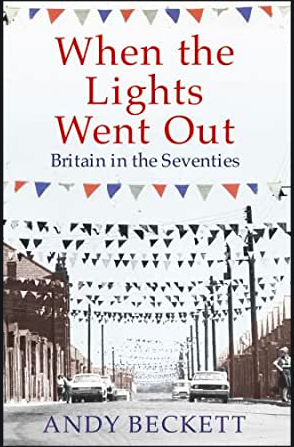Words by Adam Kerry
A new London airport in the Thames, referenda on EU membership, and radical zines. All sounds very 2010s right? Well yes and no.
This is actually the world of the 1970s that Andy Beckett draws us into in his 2009 political history book When the Lights Went Out: Britain in the Seventies.
Though I love fiction I always seem to end back in the depths of non-fiction, and my latest foray led me to this book. I won’t lie, before reading this I didn’t really know much about the 1970s, with the extent of my knowledge coming from religiously watching Life on Mars as a kid and seeing old photos of my dad with a moustache leaning on Ford Cortinas.
Whilst writing this I spoke to my Dad asking him to sum up the 1970s, his response was ‘A time of near anarchy close to revolution’, doesn’t exactly sound encouraging does it?
This book tackles what is largely considered the most difficult decade in Britain’s history, a time when the UK was regularly referred to as the ‘sick man of Europe’. Beckett presents an all encompassing view of the political world in the 1970s, encompassing everything from miner’s strikes and gay liberation marches in the early 70s (The movie Pride comes to mind!) to the behind-the-scenes rise of Thatcherism and eventual Tory landslide victory in 1979.
The decade is presented through a series of interviews with important figures of the time, and Beckett is not scared to ask difficult questions to Ex-Prime Ministers and Union leaders alike. While I am sure many titles were penned in the 80s about the events of that troubled decade, this effort is unique in its more recent perspective. The interviewees aren’t the icons of power they once were, and most seem to have spent much of their last 30 years reflecting on their past decisions, either with regret or in some cases, hardened resolve.
I’ve struggled with political non-fiction in the past, the use of academic language tends to put me to sleep and completely demotivates me from reading, but that wasn’t the case at all here. At points the book almost feels like a novel, with Beckett weaving individual narratives that draw you into the events he’s recalling, be it oil crises or economic stagnation.
The book begins right at the beginning of the decade, detailing Conservative leader Ted Heath’s seemingly fluke win in the 1970 General Election and his subsequent acclimatisation with his newfound power. However, Beckett doesn’t just limit himself to the humdrum of Westminster, he also details the subtle cultural revolutions that began to materialise in the decade. The author shows us that whilst many consider the 70s to be ‘a hangover of the fun of the sixties’ it was actually when the great party started.
Beckett details a range of 60s-esque events that took place in the 1970s, from the Watchfield Free Festival that was in essence a Government mandated bender, to a commune in Notting Hill populated by gay activists and drag queens. At one point we read an interview with Gay Liberation Activist Andrew Lumsden who remarks that ‘you were always offered dope and acid’, maybe it wasn’t all so doom and gloom back then.
It wasn’t all free festivals and drugs after 1969 however, the 70s were also a time of immense political upheaval, with attitudes to the idyllic welfare state starting to sour, anti-immigrant sentiments beginning to merge, and unimaginable amounts of union action. We learn of the unfortunate rise of the National Front, and their vile racist attacks against Bangladeshi immigrants in Brick Lane.
But there was also optimism for race relations in Britain at the time. Beckett writes of the 1976 Grunwick strikes, where a largely female group of East African Asian workers fought for higher wages with the aid of miners and dock workers. The author draws attention to the fact that those same dock workers had marched in support of Enoch Powell’s ‘Rivers of Blood speech’ just 9 years previous.
Though hard to imagine, the Left actually flourished in this bleak decade. I always thought that Thatcherism was essentially inevitable, a matter of when not if, but Beckett completely changed this narrative for me. An interviewee remarks that ‘the one inevitability in political life was the victory of world socialism’. Compare that to even mentioning socialism in the current political climate.
Beckett takes a well thought out impartial view in this book, even though it could be easy to be swayed by figures like headstrong miners and free market enthusiasts. He recognises the 1970s for what they were, a decade of mass change, and is not scared to criticise those that brought it about.




